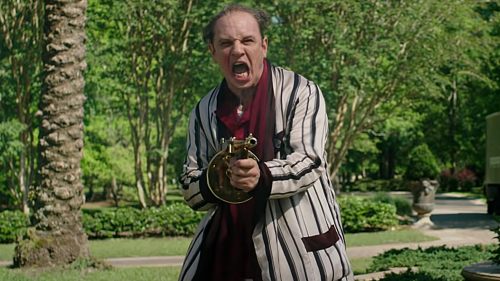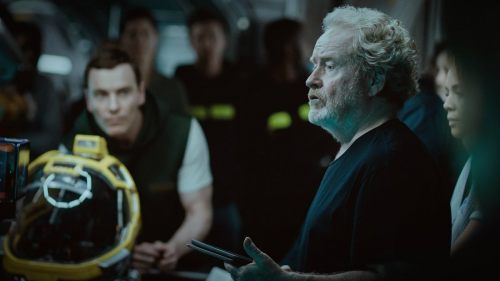ALIEN: COVENANT Review: Sympathy For The Devil
Ed. Note: This review may contain mild Alien: Covenant spoilers
Like Blade Runner and the eye that reflects the Hades landscape, Alien: Covenant begins with David’s eye opening for the very first time. His creator Peter Weyland is there in the sanitary-white room with him. Observing Michelangelo’s statue of David, the synthetic gives himself a name. Weyland asks David to play him a tune on the piano. “Dealer’s choice.” And David chooses Wagner’s Entry of the Gods Into Valhalla. It’s a gorgeous, intriguing, unsettling start to a film that takes a turn toward gothic horror, the haunted-house movie that critics believed Alien was, a film that drags its characters to hell, or perhaps a place described in screenwriter John Logan’s Penny Dreadful, the demimonde: “A half world between what we know and what we fear. A place in the shadows, rarely seen, but deeply felt.” Ridley Scott’s Alien: Covenant (co-written by Logan and Dante Harper) is a film that got under my skin and took hold, not unlike a little rogue chestburster.
Set in 2104, Covenant is a colony ship carrying 2000 people and over 1000 embryos. A neutrino blast wakes the crew up early, and the ship’s captain Branson (James Franco) is set on fire in his cryosleep pod. Branson is the husband of Katherine Waterston’s Daniels, and it’s a traumatic way for her to start her journey. With Branson dead, Oram (Billy Crudup) takes over, and she’s second in command. While fixing damage to the ship, they catch a rogue transmission from a nearby planet, and Oram thinks they should investigate. The planet is only a few weeks away — as opposed to Origae-6, their original destination, one that they’ve thoroughly vetted, which is about 7 years away. The rogue transmission sounds just like John Denver, that siren song Take Me Home, Country Roads. Who could resist? Well, Daniels could — she does her best to argue against an obviously bad idea, but she loses.
The crew finds David here, and they find aliens. All it takes is a few spores to make their way into the body for infection. They can be inhaled, they can float into your ear. The neomorph grows fast, and it’s a skittering, coltish, brutal thing that erupts from the body with spikes and bolts like a feral cat. It breaks open one poor crew member’s back, another geysers blood from his mouth. As it turns out, the mystery planet is a world once inhabited by Engineers, now David’s “dire necropolis,” with Shaw nowhere to be found, although it’s her voice they hear singing John Denver on their ghostly transmission.
David meets Covenant’s android Walter (both played by Michael Fassbender), and their interactions are some of my favorite moments in this movie — tense, poignant, compelling. It’s Walter who suspects something’s off with David. And David seems disappointed by Walter, and sad for him, a model designed after David because he was “too human” and disturbed people. Walter is incapable of creation — he can learn to play an instrument, but he cannot write the music.
Michael Fassbender’s and Katherine Waterston’s performances are the highlights of this film, though every single cast member is wonderful, particularly Danny McBride, Amy Seimetz, and Demián Bichir. I would’ve been content just to see Danny McBride’s Tennessee take on a xenomorph for the duration of Covenant’s run time. Daniels is maybe not as tough as Ripley, but her vulnerability and her backstory might make her more a little more sympathetic, and she manages to rise to the occasion. Meaningfully, Daniels is in charge of terraforming — of making a planet habitable for humans. She’s certainly more compelling than Shaw, and she’s kind to Walter. And like Ripley, Daniels is another heroine who has to contend with the hubris of man and its fallout. After a million stories where the death of a woman is a major plot point in some dude’s quest, it’s refreshing to see this reversal: a heroine whose backstory is the loss of a male partner. As the horror around her unfolds, she’s still trying to figure out whether the dream she shared with her husband is worth pursuing alone, whether her life is worth fighting for.
Making movies to explain the Alien mythos is a bit like creating 2001: A Space Odyssey, and then deciding you need a prequel to explain the Stargate. Thanks to Prometheus, gone is the mystery of the Space Jockey: now we know he’s a big white dude who made us and then wanted to kill us. But the power of Alien: Covenant is that it made me see Prometheus in a new light, to enjoy it more in spite of its issues. I finally forgave myself for being totally uninterested in Noomi Rapace’s Dr. Elizabeth Shaw, to accept that she wasn’t “new Ripley,” and that it was okay that my sympathies were with David, as treacherous as he was. I could have watched an entire movie about David alone on Prometheus, peering into the crewmembers’ dreams, learning new languages, watching Lawrence of Arabia forever.
And I believe now that Ridley Scott agrees: David should be our focus, the film’s central character, that he’s as fascinating as he is terrifying. The crewmembers mistreat and underestimate David, reduce him to a second-class citizen. Even Shaw calls him “a fucking robot.” No one seems to understand that he feels. David was the true protagonist of Prometheus, and he may be the villain of Alien: Covenant. If you’re really diabolical, like me, you might still feel that David is just as much the protagonist of Alien: Covenant as Daniels is. Imagine giving Blade Runner’s Roy Batty the extended life he wanted, and his own planet, and you get David in Alien: Covenant, Batty’s brother in spirit. He’s Frankenstein’s creature, he’s Victor Frankenstein, and he’s Satan. The devil exists, and we created him.
Alien: Covenant is a film equally gorgeous and grotesque, and sometimes its dialogue is like poetry. It blends the first science-fiction novel, Mary Shelley’s Frankenstein, with one of the greatest horror stories ever written: the Bible. And the end result is something like John Milton’s Paradise Lost with androids and aliens. It may not work for people who still want to preserve the mystery, who object to the prequels being made in the first place. And there is really no way for any movie to compete with Alien, a perfect film, or Aliens, its perfect sequel — but after those two, this beautiful nightmare is maybe the franchise’s best, a haunting and welcome new entry in the Alien mythos.



